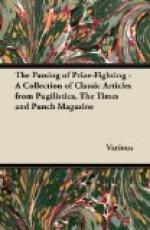* * * * *
COLLABORATION.
Biddick has placed me in a most awkward position. I am a proud man; I cannot bring myself to accept a gift of money from anybody. And yet I cannot help feeling I should be justified in taking the guinea he has sent me.
Biddick is a journalist. I was discussing the inflation of prices and asking his advice as to how to increase one’s income. “Why not write something for the Press, my dear fellow?” he said. “Five hundred words with a catchy title; nothing funny—that’s my line—but something solid and practical with money in it; the public’s always ready for that. Take your neighbour, old Diggles, and his mushroom-beds, for instance. Thriving local industry—capital copy. Try your hand at half a column, and call it ‘A Fortune in Fungus.’”
“I ’m afraid I know nothing about mushrooms, with the exception of the one I nearly died of,” I replied, “and I’m not sufficiently acquainted with Mr. Diggles to venture to invite his confidence respecting his business.”
“My dear man, I don’t ask you to tell Diggles you’re going to write him up in the newspapers; he’d kick you off the premises; he doesn’t want his secrets given away to competitors. Just dodge the old man round the sheds, get into conversation with his staff, keep your eyes open generally and you’ll pick up as much as you want for half a column. And when you’ve got your notes together bring ’em along to me. I’ll put ’em shipshape for you.”
I thanked him very gratefully.
The mushroom-sheds are situated in a field some distance from my residence, and I found it rather a fatiguing walk. After tedious watching in a cramped position through a gap in the hedge I saw Mr. Diggles emerge from a shed and move away from my direction. I lost no time in creeping forward under cover of my umbrella towards an employee, who was engaged in tossing manure. I drew out my note-book and interrogated him briefly and briskly.
“Do you rear from seeds or from cuttings?” I asked him. He scratched his head and appeared in doubt. “Are your plants self-supporting,” I went on, “or do you train them on twigs? What would be the diameter of your finest specimen?” He continued in doubt. I adopted a conversational manner. “I suppose you’ll be potting off soon? You must get very fond of your mushrooms. I think one always gets fond of anything which demands one’s whole care and attention. I wonder if I might have a peep at your proteges?”
I edged towards the door of one of the sheds, but he made no attempt to accompany me. Instead he put his hands to his mouth and shouted, “Hi, maister!”
Mr. Diggles promptly responded to the summons. There was no eluding him. I put my note-book out of sight and inquired if he could oblige me with a pound of fresh-culled mushrooms. He could, and he did. I paid him four-and-sixpence for them, the control price presumably, but he gave me no invitation to view the growing crops. I retraced my steps without having collected even an opening paragraph for “A Fortune in Fungus.”




